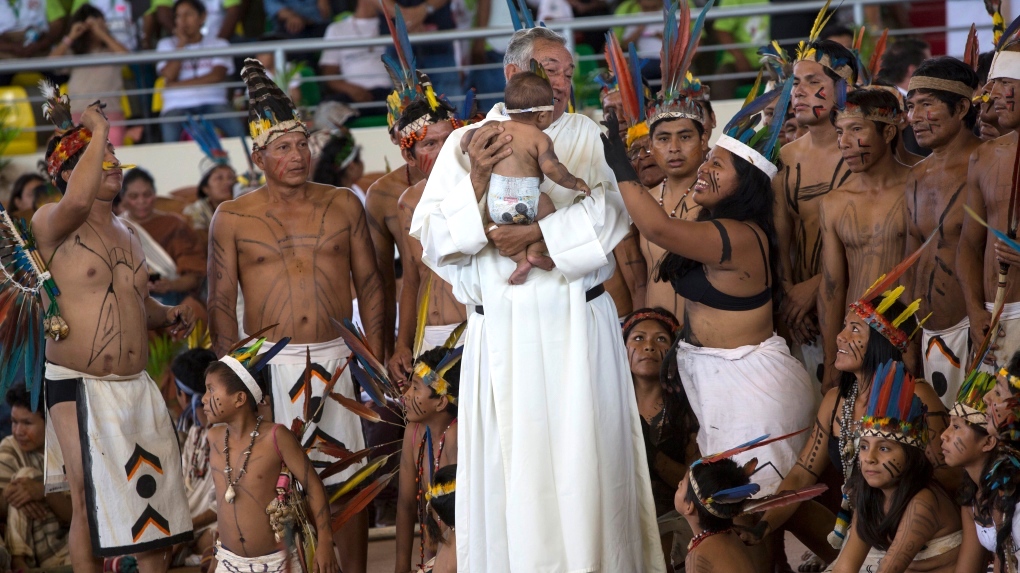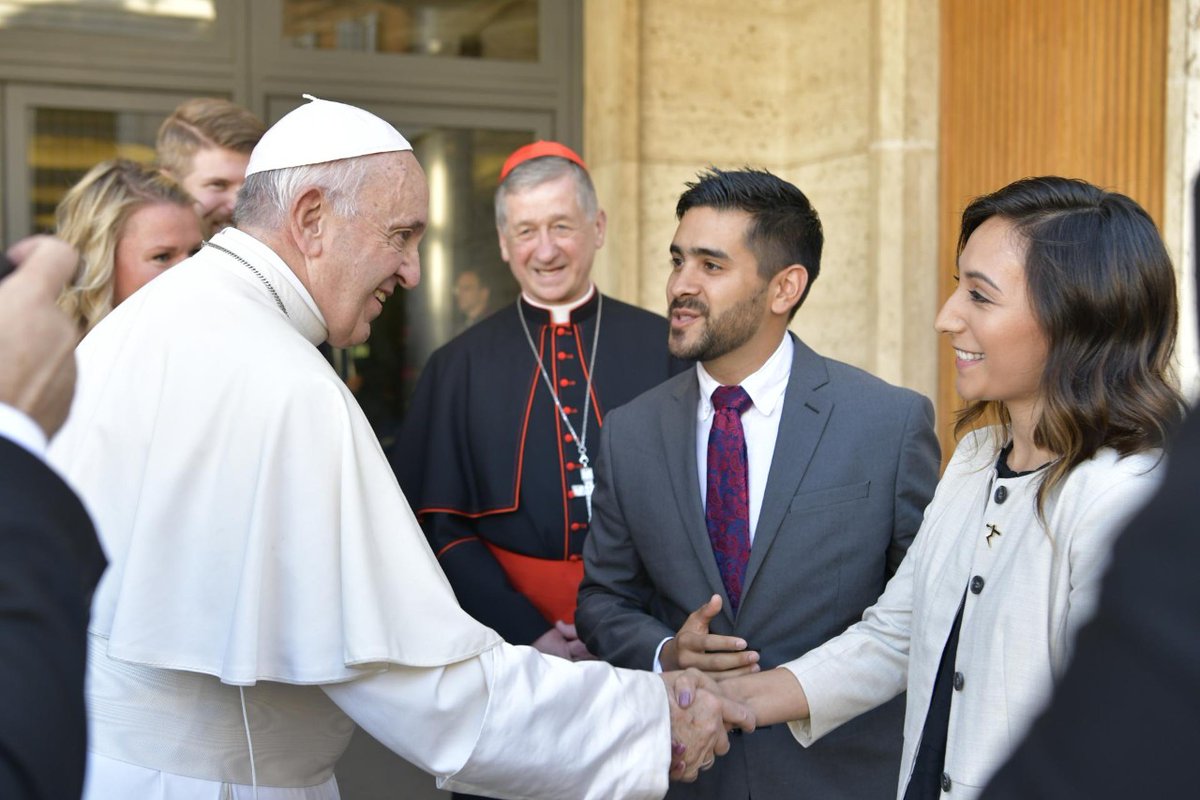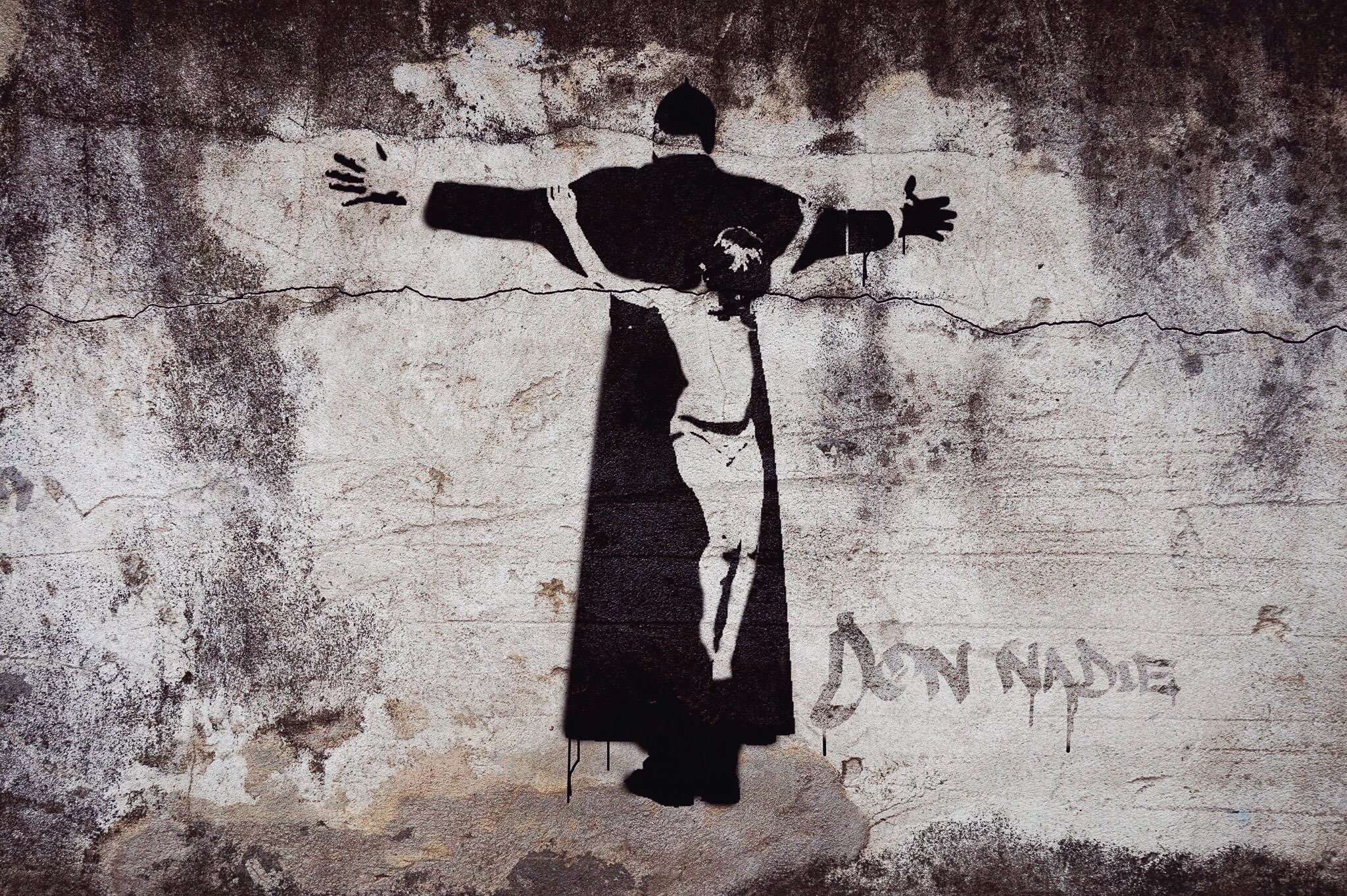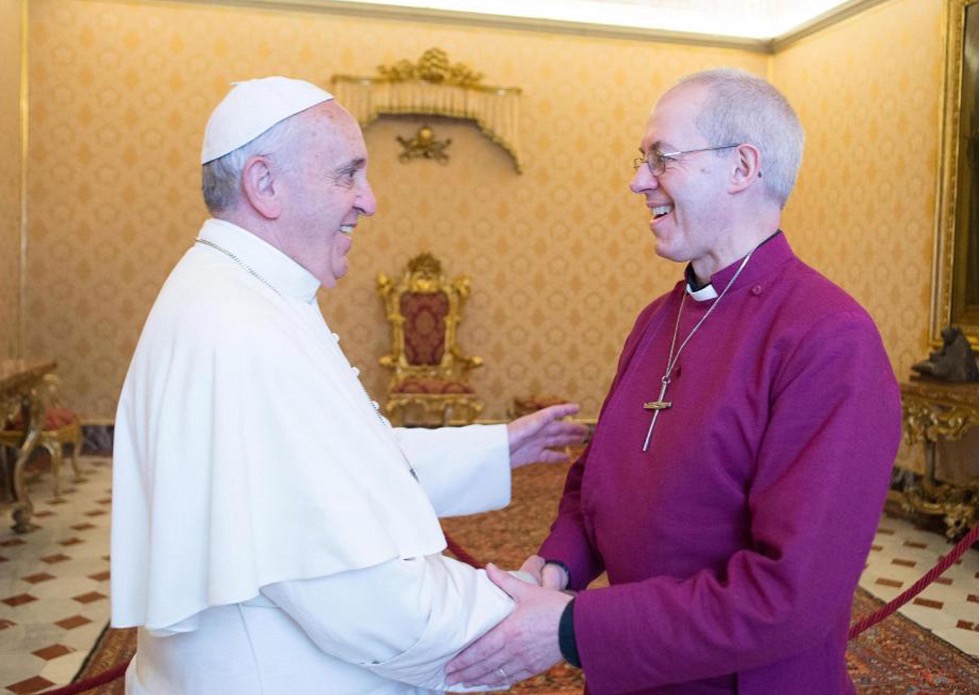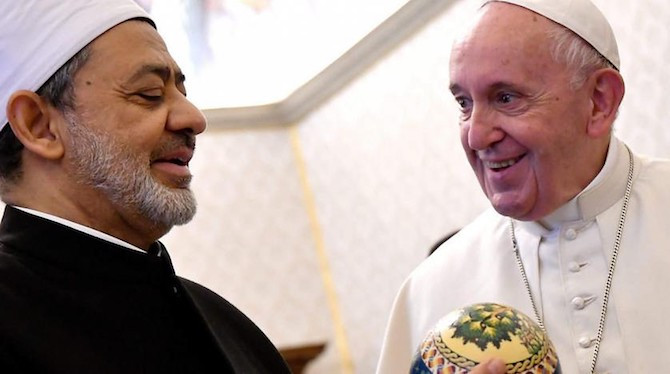
6259 words, 31 min read
Pope Francis has today published his encyclical entitled Fratelli Tutti, in which he reflects on fraternity and “social friendship”, presenting its various failures today, taking the parable of the Good Samaritan as the template to approaching it and concluding with concrete proposals for how to foster it around the world. The encyclical runs to 44K words and I highly recommend reading it in total. If, instead you are looking for an shorter collection of some key passages, the following are the ones that most spoke to me.
“[St.] Francis went to meet the Sultan [Malik-el-Kamil, in Egypt] with the same attitude that he instilled in his disciples: if they found themselves “among the Saracens and other nonbelievers”, without renouncing their own identity they were not to “engage in arguments or disputes, but to be subject to every human creature for God’s sake”. In the context of the times, this was an extraordinary recommendation. We are impressed that some eight hundred years ago Saint Francis urged that all forms of hostility or conflict be avoided and that a humble and fraternal “subjection” be shown to those who did not share his faith.” (§3)
“Francis did not wage a war of words aimed at imposing doctrines; he simply spread the love of God. He understood that “God is love and those who abide in love abide in God” (1 Jn 4:16). In this way, he became a father to all and inspired the vision of a fraternal society. Indeed, “only the man who approaches others, not to draw them into his own life, but to help them become ever more fully themselves, can truly be called a father”.” (§4)
““Here we have a splendid secret that shows us how to dream and to turn our life into a wonderful adventure. No one can face life in isolation… We need a community that supports and helps us, in which we can help one another to keep looking ahead. How important it is to dream together… By ourselves, we risk seeing mirages, things that are not there. Dreams, on the other hand, are built together”.[6] Let us dream, then, as a single human family, as fellow travelers sharing the same flesh, as children of the same earth which is our common home, each of us bringing the richness of his or her beliefs and convictions, each of us with his or her own voice, brothers and sisters all.” (§8)
“Ancient conflicts thought long buried are breaking out anew, while instances of a myopic, extremist, resentful and aggressive nationalism are on the rise. In some countries, a concept of popular and national unity influenced by various ideologies is creating new forms of selfishness and a loss of the social sense under the guise of defending national interests. Once more we are being reminded that “each new generation must take up the struggles and attainments of past generations, while setting its sights even higher. This is the path. Goodness, together with love, justice and solidarity, are not achieved once and for all; they have to be realized each day. It is not possible to settle for what was achieved in the past and complacently enjoy it, as if we could somehow disregard the fact that many of our brothers and sisters still endure situations that cry out for our attention”.” (§11)
“One effective way to weaken historical consciousness, critical thinking, the struggle for justice and the processes of integration is to empty great words of their meaning or to manipulate them. Nowadays, what do certain words like democracy, freedom, justice or unity really mean? They have been bent and shaped to serve as tools for domination, as meaningless tags that can be used to justify any action.” (§14)
“The best way to dominate and gain control over people is to spread despair and discouragement, even under the guise of defending certain values. Today, in many countries, hyperbole, extremism and polarization have become political tools. Employing a strategy of ridicule, suspicion and relentless criticism, in a variety of ways one denies the right of others to exist or to have an opinion. Their share of the truth and their values are rejected and, as a result, the life of society is impoverished and subjected to the hubris of the powerful. Political life no longer has to do with healthy debates about long-term plans to improve people’s lives and to advance the common good, but only with slick marketing techniques primarily aimed at discrediting others. In this craven exchange of charges and counter-charges, debate degenerates into a permanent state of disagreement and confrontation.
Amid the fray of conflicting interests, where victory consists in eliminating one’s opponents, how is it possible to raise our sights to recognize our neighbours or to help those who have fallen along the way? A plan that would set great goals for the development of our entire human family nowadays sounds like madness. We are growing ever more distant from one another, while the slow and demanding march towards an increasingly united and just world is suffering a new and dramatic setback.” (§15-16)
“[A] readiness to discard others finds expression in vicious attitudes that we thought long past, such as racism, which retreats underground only to keep reemerging. Instances of racism continue to shame us, for they show that our supposed social progress is not as real or definitive as we think.” (§20)
“Paradoxically, we have certain ancestral fears that technological development has not succeeded in eliminating; indeed, those fears have been able to hide and spread behind new technologies. Today too, outside the ancient town walls lies the abyss, the territory of the unknown, the wilderness. Whatever comes from there cannot be trusted, for it is unknown, unfamiliar, not part of the village. It is the territory of the “barbarian”, from whom we must defend ourselves at all costs. As a result, new walls are erected for self-preservation, the outside world ceases to exist and leaves only “my” world, to the point that others, no longer considered human beings possessed of an inalienable dignity, become only “them”. Once more, we encounter “the temptation to build a culture of walls, to raise walls, walls in the heart, walls on the land, in order to prevent this encounter with other cultures, with other people. And those who raise walls will end up as slaves within the very walls they have built. They are left without horizons, for they lack this interchange with others”.” (§27)
“In today’s world, the sense of belonging to a single human family is fading, and the dream of working together for justice and peace seems an outdated utopia. What reigns instead is a cool, comfortable and globalized indifference, born of deep disillusionment concealed behind a deceptive illusion: thinking that we are all-powerful, while failing to realize that we are all in the same boat. This illusion, unmindful of the great fraternal values, leads to “a sort of cynicism. For that is the temptation we face if we go down the road of disenchantment and disappointment… Isolation and withdrawal into one’s own interests are never the way to restore hope and bring about renewal. Rather, it is closeness; it is the culture of encounter. Isolation, no; closeness, yes. Culture clash, no; culture of encounter, yes”.” (§30)
“All too quickly, however, we forget the lessons of history, “the teacher of life”. Once this health crisis passes, our worst response would be to plunge even more deeply into feverish consumerism and new forms of egotistic self-preservation. God willing, after all this, we will think no longer in terms of “them” and “those”, but only “us”. If only this may prove not to be just another tragedy of history from which we learned nothing. If only we might keep in mind all those elderly persons who died for lack of respirators, partly as a result of the dismantling, year after year, of healthcare systems. If only this immense sorrow may not prove useless, but enable us to take a step forward towards a new style of life. If only we might rediscover once for all that we need one another, and that in this way our human family can experience a rebirth, with all its faces, all its hands and all its voices, beyond the walls that we have erected.” (§35)
“No one will ever openly deny that [migrants] are human beings, yet in practice, by our decisions and the way we treat them, we can show that we consider them less worthy, less important, less human. For Christians, this way of thinking and acting is unacceptable, since it sets certain political preferences above deep convictions of our faith: the inalienable dignity of each human person regardless of origin, race or religion, and the supreme law of fraternal love.” (§39)
“I realize that some people are hesitant and fearful with regard to migrants. I consider this part of our natural instinct of self-defence. Yet it is also true that an individual and a people are only fruitful and productive if they are able to develop a creative openness to others. I ask everyone to move beyond those primal reactions because “there is a problem when doubts and fears condition our way of thinking and acting to the point of making us intolerant, closed and perhaps even – without realizing it – racist. In this way, fear deprives us of the desire and the ability to encounter the other”.” (§41)
“Social aggression has found unparalleled room for expansion through computers and mobile devices.
This has now given free rein to ideologies. Things that until a few years ago could not be said by anyone without risking the loss of universal respect can now be said with impunity, and in the crudest of terms, even by some political figures. Nor should we forget that “there are huge economic interests operating in the digital world, capable of exercising forms of control as subtle as they are invasive, creating mechanisms for the manipulation of consciences and of the democratic process. The way many platforms work often ends up favouring encounter between persons who think alike, shielding them from debate. These closed circuits facilitate the spread of fake news and false information, fomenting prejudice and hate”.” (§44-45)
“True wisdom demands an encounter with reality. Today, however, everything can be created, disguised and altered. A direct encounter even with the fringes of reality can thus prove intolerable. A mechanism of selection then comes into play, whereby I can immediately separate likes from dislikes, what I consider attractive from what I deem distasteful. In the same way, we can choose the people with whom we wish to share our world. Persons or situations we find unpleasant or disagreeable are simply deleted in today’s virtual networks; a virtual circle is then created, isolating us from the real world in which we are living.” (§47)
“Together, we can seek the truth in dialogue, in relaxed conversation or in passionate debate. To do so calls for perseverance; it entails moments of silence and suffering, yet it can patiently embrace the broader experience of individuals and peoples. The flood of information at our fingertips does not make for greater wisdom. Wisdom is not born of quick searches on the internet nor is it a mass of unverified data. That is not the way to mature in the encounter with truth. Conversations revolve only around the latest data; they become merely horizontal and cumulative. We fail to keep our attention focused, to penetrate to the heart of matters, and to recognize what is essential to give meaning to our lives. Freedom thus becomes an illusion that we are peddled, easily confused with the ability to navigate the internet. The process of building fraternity, be it local or universal, can only be undertaken by spirits that are free and open to authentic encounters.” (§50)
“Despite these dark clouds, which may not be ignored, I would like in the following pages to take up and discuss many new paths of hope. For God continues to sow abundant seeds of goodness in our human family. The recent pandemic enabled us to recognize and appreciate once more all those around us who, in the midst of fear, responded by putting their lives on the line. We began to realize that our lives are interwoven with and sustained by ordinary people valiantly shaping the decisive events of our shared history: doctors, nurses, pharmacists, storekeepers and supermarket workers, cleaning personnel, caretakers, transport workers, men and women working to provide essential services and public safety, volunteers, priests and religious… They understood that no one is saved alone.” (§54)
“The parable [of the Good Samaritan] is clear and straightforward, yet it also evokes the interior struggle that each of us experiences as we gradually come to know ourselves through our relationships with our brothers and sisters. Sooner or later, we will all encounter a person who is suffering. Today there are more and more of them. The decision to include or exclude those lying wounded along the roadside can serve as a criterion for judging every economic, political, social and religious project. Each day we have to decide whether to be Good Samaritans or indifferent bystanders. And if we extend our gaze to the history of our own lives and that of the entire world, all of us are, or have been, like each of the characters in the parable. All of us have in ourselves something of the wounded man, something of the robber, something of the passers-by, and something of the Good Samaritan.” (§69)
“It is remarkable how the various characters in the story change, once confronted by the painful sight of the poor man on the roadside. The distinctions between Judean and Samaritan, priest and merchant, fade into insignificance. Now there are only two kinds of people: those who care for someone who is hurting and those who pass by; those who bend down to help and those who look the other way and hurry off. Here, all our distinctions, labels and masks fall away: it is the moment of truth. Will we bend down to touch and heal the wounds of others? Will we bend down and help another to get up? This is today’s challenge, and we should not be afraid to face it. In moments of crisis, decisions become urgent. It could be said that, here and now, anyone who is neither a robber nor a passer-by is either injured himself or bearing an injured person on his shoulders.” (§70)
“One detail about the passers-by does stand out: they were religious, devoted to the worship of God: a priest and a Levite. This detail should not be overlooked. It shows that belief in God and the worship of God are not enough to ensure that we are actually living in a way pleasing to God. A believer may be untrue to everything that his faith demands of him, and yet think he is close to God and better than others. The guarantee of an authentic openness to God, on the other hand, is a way of practising the faith that helps open our hearts to our brothers and sisters. Saint John Chrysostom expressed this pointedly when he challenged his Christian hearers: “Do you wish to honour the body of the Saviour? Do not despise it when it is naked. Do not honour it in church with silk vestments while outside it is naked and numb with cold”. Paradoxically, those who claim to be unbelievers can sometimes put God’s will into practice better than believers.” (§74)
““Robbers” usually find secret allies in those who “pass by and look the other way”. There is a certain interplay between those who manipulate and cheat society, and those who, while claiming to be detached and impartial critics, live off that system and its benefits. There is a sad hypocrisy when the impunity of crime, the use of institutions for personal or corporate gain, and other evils apparently impossible to eradicate, are accompanied by a relentless criticism of everything, a constant sowing of suspicion that results in distrust and confusion. The complaint that “everything is broken” is answered by the claim that “it can’t be fixed”, or “what can I do?” This feeds into disillusionment and despair, and hardly encourages a spirit of solidarity and generosity. Plunging people into despair closes a perfectly perverse circle: such is the agenda of the invisible dictatorship of hidden interests that have gained mastery over both resources and the possibility of thinking and expressing opinions.” (§75)
“I sometimes wonder why […] it took so long for the Church unequivocally to condemn slavery and various forms of violence. Today, with our developed spirituality and theology, we have no excuses. Still, there are those who appear to feel encouraged or at least permitted by their faith to support varieties of narrow and violent nationalism, xenophobia and contempt, and even the mistreatment of those who are different. Faith, and the humanism it inspires, must maintain a critical sense in the face of these tendencies, and prompt an immediate response whenever they rear their head. For this reason, it is important that catechesis and preaching speak more directly and clearly about the social meaning of existence, the fraternal dimension of spirituality, our conviction of the inalienable dignity of each person, and our reasons for loving and accepting all our brothers and sisters.” (§86)
“People can develop certain habits that might appear as moral values: fortitude, sobriety, hard work and similar virtues. Yet if the acts of the various moral virtues are to be rightly directed, one needs to take into account the extent to which they foster openness and union with others. That is made possible by the charity that God infuses. Without charity, we may perhaps possess only apparent virtues, incapable of sustaining life in common.” (§91)
“The spiritual stature of a person’s life is measured by love, which in the end remains “the criterion for the definitive decision about a human life’s worth or lack thereof”.[71] Yet some believers think that it consists in the imposition of their own ideologies upon everyone else, or in a violent defence of the truth, or in impressive demonstrations of strength. All of us, as believers, need to recognize that love takes first place: love must never be put at risk, and the greatest danger lies in failing to love (cf. 1 Cor 13:1-13).” (§92)
“Love, then, is more than just a series of benevolent actions. Those actions have their source in a union increasingly directed towards others, considering them of value, worthy, pleasing and beautiful apart from their physical or moral appearances. Our love for others, for who they are, moves us to seek the best for their lives. Only by cultivating this way of relating to one another will we make possible a social friendship that excludes no one and a fraternity that is open to all.” (§94)
“Love also impels us towards universal communion. No one can mature or find fulfilment by withdrawing from others. By its very nature, love calls for growth in openness and the ability to accept others as part of a continuing adventure that makes every periphery converge in a greater sense of mutual belonging. As Jesus told us: “You are all brothers” (Mt 23:8).” (§95)
“Social friendship and universal fraternity necessarily call for an acknowledgement of the worth of every human person, always and everywhere. If each individual is of such great worth, it must be stated clearly and firmly that “the mere fact that some people are born in places with fewer resources or less development does not justify the fact that they are living with less dignity”. This is a basic principle of social life that tends to be ignored in a variety of ways by those who sense that it does not fit into their worldview or serve their purposes.” (§106)
“[I]f one person lacks what is necessary to live with dignity, it is because another person is detaining it. Saint John Chrysostom summarizes it in this way: “Not to share our wealth with the poor is to rob them and take away their livelihood. The riches we possess are not our own, but theirs as well”. In the words of Saint Gregory the Great, “When we provide the needy with their basic needs, we are giving them what belongs to them, not to us”.” (§119)
“If every human being possesses an inalienable dignity, if all people are my brothers and sisters, and if the world truly belongs to everyone, then it matters little whether my neighbour was born in my country or elsewhere. My own country also shares responsibility for his or her development, although it can fulfil that responsibility in a variety of ways. It can offer a generous welcome to those in urgent need, or work to improve living conditions in their native lands by refusing to exploit those countries or to drain them of natural resources, backing corrupt systems that hinder the dignified development of their peoples. What applies to nations is true also for different regions within each country, since there too great inequalities often exist. At times, the inability to recognize equal human dignity leads the more developed regions in some countries to think that they can jettison the “dead weight” of poorer regions and so increase their level of consumption.” (§125)
“Ideally, unnecessary migration ought to be avoided; this entails creating in countries of origin the conditions needed for a dignified life and integral development. Yet until substantial progress is made in achieving this goal, we are obliged to respect the right of all individuals to find a place that meets their basic needs and those of their families, and where they can find personal fulfilment. Our response to the arrival of migrating persons can be summarized by four words: welcome, protect, promote and integrate.” (§129)
“Indeed, when we open our hearts to those who are different, this enables them, while continuing to be themselves, to develop in new ways. The different cultures that have flourished over the centuries need to be preserved, lest our world be impoverished. At the same time, those cultures should be encouraged to be open to new experiences through their encounter with other realities, for the risk of succumbing to cultural sclerosis is always present.” (§134)
“I do not wish to limit this presentation to a kind of utilitarian approach. There is always the factor of “gratuitousness”: the ability to do some things simply because they are good in themselves, without concern for personal gain or recompense. Gratuitousness makes it possible for us to welcome the stranger, even though this brings us no immediate tangible benefit. Some countries, though, presume to accept only scientists or investors.” (§139)
“Just as there can be no dialogue with “others” without a sense of our own identity, so there can be no openness between peoples except on the basis of love for one’s own land, one’s own people, one’s own cultural roots. I cannot truly encounter another unless I stand on firm foundations, for it is on the basis of these that I can accept the gift the other brings and in turn offer an authentic gift of my own. I can welcome others who are different, and value the unique contribution they have to make, only if I am firmly rooted in my own people and culture. Everyone loves and cares for his or her native land and village, just as they love and care for their home and are personally responsible for its upkeep. The common good likewise requires that we protect and love our native land. Otherwise, the consequences of a disaster in one country will end up affecting the entire planet. All this brings out the positive meaning of the right to property: I care for and cultivate something that I possess, in such a way that it can contribute to the good of all.” (§143)
“Other cultures are not “enemies” from which we need to protect ourselves, but differing reflections of the inexhaustible richness of human life. Seeing ourselves from the perspective of another, of one who is different, we can better recognize our own unique features and those of our culture: its richness, its possibilities and its limitations. Our local experience needs to develop “in contrast to” and “in harmony with” the experiences of others living in diverse cultural contexts.” (§147)
“Lack of concern for the vulnerable can hide behind a populism that exploits them demagogically for its own purposes, or a liberalism that serves the economic interests of the powerful. In both cases, it becomes difficult to envisage an open world that makes room for everyone, including the most vulnerable, and shows respect for different cultures.” (§155)
“My criticism of the technocratic paradigm involves more than simply thinking that if we control its excesses everything will be fine. The bigger risk does not come from specific objects, material realities or institutions, but from the way that they are used. It has to do with human weakness, the proclivity to selfishness that is part of what the Christian tradition refers to as “concupiscence”: the human inclination to be concerned only with myself, my group, my own petty interests. Concupiscence is not a flaw limited to our own day. It has been present from the beginning of humanity, and has simply changed and taken on different forms down the ages, using whatever means each moment of history can provide. Concupiscence, however, can be overcome with the help of God.
Education and upbringing, concern for others, a well-integrated view of life and spiritual growth: all these are essential for quality human relationships and for enabling society itself to react against injustices, aberrations and abuses of economic, technological, political and media power. Some liberal approaches ignore this factor of human weakness; they envisage a world that follows a determined order and is capable by itself of ensuring a bright future and providing solutions for every problem.” (§166-167)
“Recognizing that all people are our brothers and sisters, and seeking forms of social friendship that include everyone, is not merely utopian. It demands a decisive commitment to devising effective means to this end. Any effort along these lines becomes a noble exercise of charity. For whereas individuals can help others in need, when they join together in initiating social processes of fraternity and justice for all, they enter the “field of charity at its most vast, namely political charity”. This entails working for a social and political order whose soul is social charity. Once more, I appeal for a renewed appreciation of politics as “a lofty vocation and one of the highest forms of charity, inasmuch as it seeks the common good”.” (§180)
“It is an act of charity to assist someone suffering, but it is also an act of charity, even if we do not know that person, to work to change the social conditions that caused his or her suffering. If someone helps an elderly person cross a river, that is a fine act of charity. The politician, on the other hand, builds a bridge, and that too is an act of charity. While one person can help another by providing something to eat, the politician creates a job for that other person, and thus practices a lofty form of charity that ennobles his or her political activity.” (§186)
“At a time when various forms of fundamentalist intolerance are damaging relationships between individuals, groups and peoples, let us be committed to living and teaching the value of respect for others, a love capable of welcoming differences, and the priority of the dignity of every human being over his or her ideas, opinions, practices and even sins. Even as forms of fanaticism, closedmindedness and social and cultural fragmentation proliferate in present-day society, a good politician will take the first step and insist that different voices be heard. Disagreements may well give rise to conflicts, but uniformity proves stifling and leads to cultural decay. May we not be content with being enclosed in one fragment of reality.” (§191)
“Dialogue is often confused with something quite different: the feverish exchange of opinions on social networks, frequently based on media information that is not always reliable. These exchanges are merely parallel monologues. They may attract some attention by their sharp and aggressive tone. But monologues engage no one, and their content is frequently self-serving and contradictory.” (§200)
“Authentic social dialogue involves the ability to respect the other’s point of view and to admit that it may include legitimate convictions and concerns. Based on their identity and experience, others have a contribution to make, and it is desirable that they should articulate their positions for the sake of a more fruitful public debate. When individuals or groups are consistent in their thinking, defend their values and convictions, and develop their arguments, this surely benefits society.” (§203)
“Is it possible to be concerned for truth, to seek the truth that responds to life’s deepest meaning? What is law without the conviction, born of age-old reflection and great wisdom, that each human being is sacred and inviolable? If society is to have a future, it must respect the truth of our human dignity and submit to that truth. Murder is not wrong simply because it is socially unacceptable and punished by law, but because of a deeper conviction. This is a non-negotiable truth attained by the use of reason and accepted in conscience. A society is noble and decent not least for its support of the pursuit of truth and its adherence to the most basic of truths.” (§207)
“If something always serves the good functioning of society, is it not because, lying beyond it, there is an enduring truth accessible to the intellect? Inherent in the nature of human beings and society there exist certain basic structures to support our development and survival. Certain requirements thus ensue, and these can be discovered through dialogue, even though, strictly speaking, they are not created by consensus. The fact that certain rules are indispensable for the very life of society is a sign that they are good in and of themselves. There is no need, then, to oppose the interests of society, consensus and the reality of objective truth. These three realities can be harmonized whenever, through dialogue, people are unafraid to get to the heart of an issue.” (§212)
“The image of a polyhedron can represent a society where differences coexist, complementing, enriching and reciprocally illuminating one another, even amid disagreements and reservations. Each of us can learn something from others. No one is useless and no one is expendable. This also means finding ways to include those on the peripheries of life. For they have another way of looking at things; they see aspects of reality that are invisible to the centres of power where weighty decisions are made.” (§214)
“[S]ome things may have to be renounced for the common good. No one can possess the whole truth or satisfy his or her every desire, since that pretension would lead to nullifying others by denying their rights. A false notion of tolerance has to give way to a dialogic realism on the part of men and women who remain faithful to their own principles while recognizing that others also have the right to do likewise. This is the genuine acknowledgment of the other that is made possible by love alone. We have to stand in the place of others, if we are to discover what is genuine, or at least understandable, in their motivations and concerns.” (§221)
“Renewed encounter does not mean returning to a time prior to conflicts. All of us change over time. Pain and conflict transform us. We no longer have use for empty diplomacy, dissimulation, double-speak, hidden agendas and good manners that mask reality. Those who were fierce enemies have to speak from the stark and clear truth. They have to learn how to cultivate a penitential memory, one that can accept the past in order not to cloud the future with their own regrets, problems and plans. Only by basing themselves on the historical truth of events will they be able to make a broad and persevering effort to understand one another and to strive for a new synthesis for the good of all.” (§226)
“[This] does [not] mean calling for forgiveness when it involves renouncing our own rights, confronting corrupt officials, criminals or those who would debase our dignity. We are called to love everyone, without exception; at the same time, loving an oppressor does not mean allowing him to keep oppressing us, or letting him think that what he does is acceptable. On the contrary, true love for an oppressor means seeking ways to make him cease his oppression; it means stripping him of a power that he does not know how to use, and that diminishes his own humanity and that of others. Forgiveness does not entail allowing oppressors to keep trampling on their own dignity and that of others, or letting criminals continue their wrongdoing. Those who suffer injustice have to defend strenuously their own rights and those of their family, precisely because they must preserve the dignity they have received as a loving gift from God. If a criminal has harmed me or a loved one, no one can forbid me from demanding justice and ensuring that this person – or anyone else – will not harm me, or others, again. This is entirely just; forgiveness does not forbid it but actually demands it.
The important thing is not to fuel anger, which is unhealthy for our own soul and the soul of our people, or to become obsessed with taking revenge and destroying the other. No one achieves inner peace or returns to a normal life in that way. The truth is that “no family, no group of neighbours, no ethnic group, much less a nation, has a future if the force that unites them, brings them together and resolves their differences is vengeance and hatred. We cannot come to terms and unite for the sake of revenge, or treating others with the same violence with which they treated us, or plotting opportunities for retaliation under apparently legal auspices”. Nothing is gained this way and, in the end, everything is lost.” (§241-242)
“When conflicts are not resolved but kept hidden or buried in the past, silence can lead to complicity in grave misdeeds and sins. Authentic reconciliation does not flee from conflict, but is achieved in conflict, resolving it through dialogue and open, honest and patient negotiation.” (§244)
“Nowadays, it is easy to be tempted to turn the page, to say that all these things happened long ago and we should look to the future. For God’s sake, no! We can never move forward without remembering the past; we do not progress without an honest and unclouded memory. We need to “keep alive the flame of collective conscience, bearing witness to succeeding generations to the horror of what happened”, because that witness “awakens and preserves the memory of the victims, so that the conscience of humanity may rise up in the face of every desire for dominance and destruction”. The victims themselves – individuals, social groups or nations – need to do so, lest they succumb to the mindset that leads to justifying reprisals and every kind of violence in the name of the great evil endured. For this reason, I think not only of the need to remember the atrocities, but also all those who, amid such great inhumanity and corruption, retained their dignity and, with gestures small or large, chose the part of solidarity, forgiveness and fraternity. To remember goodness is also a healthy thing.” (§249)
“War can easily be chosen by invoking all sorts of allegedly humanitarian, defensive or precautionary excuses, and even resorting to the manipulation of information. In recent decades, every single war has been ostensibly “justified”. The Catechism of the Catholic Church speaks of the possibility of legitimate defence by means of military force, which involves demonstrating that certain “rigorous conditions of moral legitimacy” have been met. Yet it is easy to fall into an overly broad interpretation of this potential right. In this way, some would also wrongly justify even “preventive” attacks or acts of war that can hardly avoid entailing “evils and disorders graver than the evil to be eliminated”. At issue is whether the development of nuclear, chemical and biological weapons, and the enormous and growing possibilities offered by new technologies, have granted war an uncontrollable destructive power over great numbers of innocent civilians. The truth is that “never has humanity had such power over itself, yet nothing ensures that it will be used wisely”. We can no longer think of war as a solution, because its risks will probably always be greater than its supposed benefits. In view of this, it is very difficult nowadays to invoke the rational criteria elaborated in earlier centuries to speak of the possibility of a “just war”. Never again war!” (§258)
“A journey of peace is possible between religions. Its point of departure must be God’s way of seeing things. “God does not see with his eyes, God sees with his heart. And God’s love is the same for everyone, regardless of religion. Even if they are atheists, his love is the same. When the last day comes, and there is sufficient light to see things as they really are, we are going to find ourselves quite surprised”.” (§281)
